Like it or not, auditioning is a HUGE part of working in voice over! Voice acting auditions are usually done by recording a short sample of a script which is then submitted to a potential client for review.
The client can then hear exactly what you’ll sound like on their script and decide whether or not to hire you based on your audition.
Think of it like this:
You know when you go to an ice cream shop and you want to sample a few flavors before you commit? Well in this case, your voice is one of the flavors. If a client likes how you sound on the audition sample, they’ll hire you to do the voice over job.
So you can see how responding to voice acting auditions can lead to paid work. But how do you find voice acting auditions in the first place?
Some people think if they work with voice acting agents, they’ll be flooded with work. Having an agent helps but it’s only one way to get voice over work.
The truth is, voice acting auditions come in many forms. And one of the fastest ways to receive voice acting casting calls on a daily basis is by joining an online voice casting website like Voices.com. The cost is $499 per year to become a Premium Member.
If you’re interested in the premium membership, use promo code VOICEACTINGAFF and you’ll save $50 (this is an affiliate code).
That cost may seem high if you’re just getting started in voice acting but there are many benefits, as you’ll see.
I think it’s well worth the investment.
I’ve been a member of Voices since 2006. I’ve seen the company evolve over time. Overall I’ve seen many improvements and they’ve made the auditioning process quick and simple for voice talents. I like Voices because it works and it’s quick and easy for voice talents to use.
Here’s an insider look at how to quickly review and respond to voice acting auditions on Voices.com.
Reviewing Voice Acting Auditions
After you become a member of Voices.com you’ll receive job opportunity emails on a daily basis. So anytime a new voice over job that matches your profile is posted, you’ll be notified and given a chance to audition for that job.
But…just because you receive an audition invitation doesn’t mean that you should automatically audition for that job. Being a successful voice actor means using your time wisely to ensure a great “ROA” or return on auditions.
So how do you decide which invitations to accept and submit an audition for and which ones to delete?
By using a process to help you eliminate the jobs that don’t work for you. It all starts by getting into the details of the job posting.
Here’s what a voice acting audition invitation email looks like:
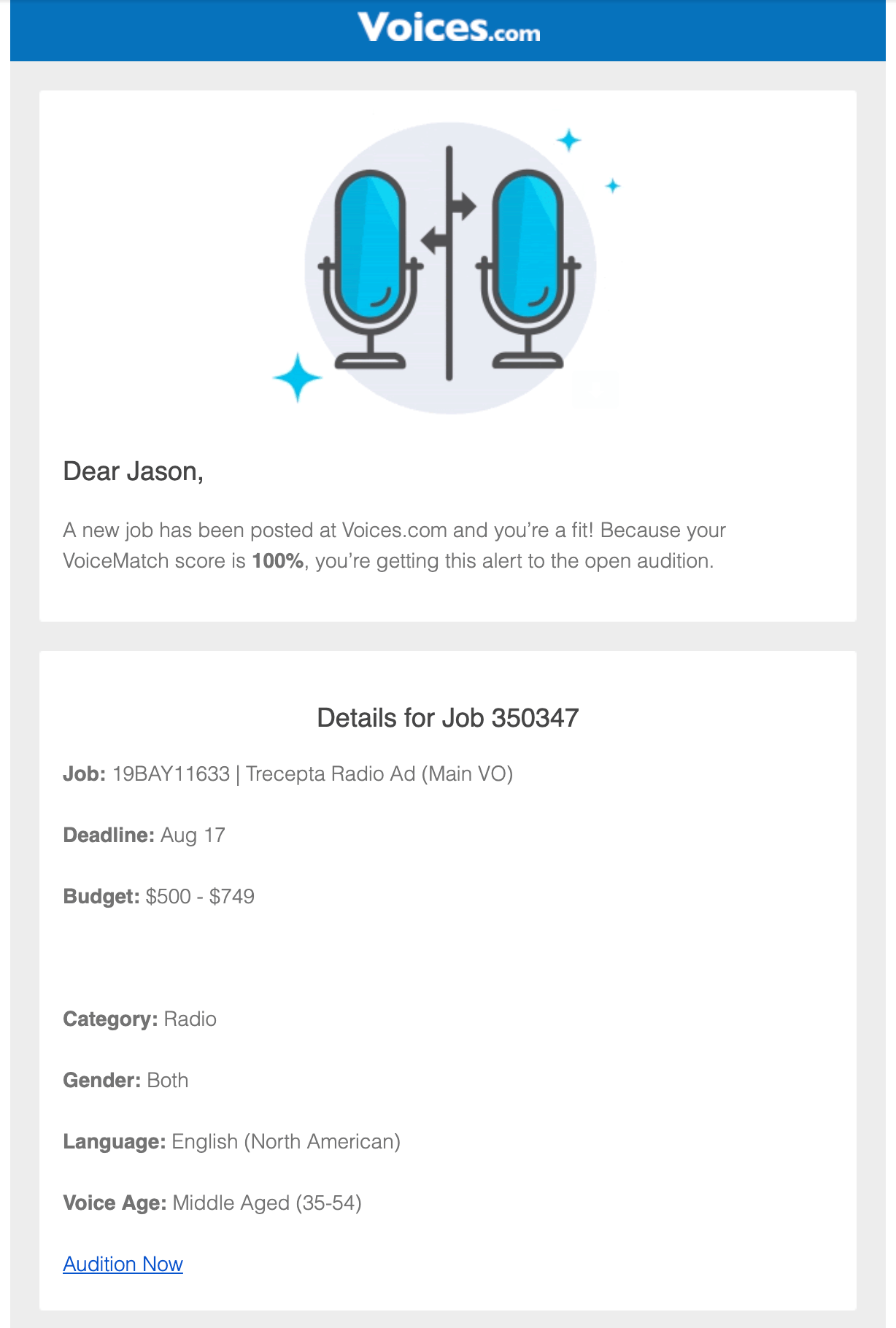
Just because you receive an audition invitation doesn’t necessarily mean you should submit an audition. You need to look closely and decide whether you’re a good fit for what the client is seeking.
I don’t recommend spending a lot of time looking at the email itself but it does contain some key information that will help you decide if you should look into the job any further. Responding to an audition doesn’t take much time, but you don’t want to waste the client’s time or your time by auditioning for something you’re not a good match for and zero shot at getting.
The VoiceMatch score algorithm does an excellent job of narrowing down the best jobs based on your talent profile. But sometimes by just looking at the invitation email itself, I’ll see a red flag and know I should not respond to the job.
Language, gender and voice age will most likely match what you have in your profile, otherwise you wouldn’t have received the invitation. In other words, you won’t receive invites for jobs in other languages or the opposite gender.
I look at the invitation email for a clue as to why I should pass on auditioning for the job. This could be the budget, maybe it requires an accent or maybe the topic is just not something I’m comfortable with.
Whatever the reason, if you see something you don’t like, just delete the email and wait for your next opportunity.
That’s really what you’re doing during this part of the audition review process. You’re taking a quick glance at the job’s key information. This is your first chance to eliminate an audition and save yourself time.
If nothing stands out as a reason for deleting the job without auditioning, this job just passed the first elimination round!
To get more details on the audition posting, click the link in the email to go directly to the job posting on the website.
Uncovering More Details about the Audition
Once on the job posting page, you’ll see everything you need to make an informed final decision about whether you should audition. On this page you’ll find the job posting details, the audition script and detailed instructions and directions.
First and foremost on this page, take a glance at the right side to see two important numbers: first, your VoiceMatch score and second, the number of responses. The number of responses show how many other voice actors have already submitted an audition for this job. This will give you a good idea of whether or not you are late to the audition.

It’s always good to be one of the first to respond (assuming you’re a good fit for the job).
But in the example above, 52 voice talents have already auditioned for this job. That’s kind of high if you think about it from the client’s point of view.
This client will have at least 52 auditions they can listen to besides yours. Seeing this number may make you think it’s not worth it to submit your audition now.
But don’t delete the job strictly on the number of responses. Why not?
Luckily, it doesn’t quite work on a first submitted first heard by the client basis. Thanks to VoiceMatch.
The VoiceMatch score is based on your voice talent profile and description vs the description of the job. In other words, how well your talent profile matches the job description.
A higher VoiceMatch score will bump your proposal/audition ahead of other talents that applied with lower VoiceMatch scores, even if they submitted their audition before you.
Once a client describes what they are looking for in a voice talent, Voices wants that client to find the right voice as quickly and easily as possible.
That is why VoiceMatch works the way it does. It moves talents who it believes best match the client’s needs to the top of the list, so they’ll be heard first.
So back to the example above, I’m at a 90% VoiceMatch for this job. 100% would be better. But say if 40 of those 56 talents who already auditioned have a VoiceMatch score of 85% and the other 16 responses have a 100% VoiceMatch, that would place me in the 17th position when the client listens. 17th is much better than 57th!
Of course that assumes no other voice talents with higher VoiceMatch scores audition after me, but you get the idea.
I should also say that I’ve submitted auditions to jobs that already had 100+ responses before I got mine in and even though I was late, I was hired by the client. So don’t let the high number of responses discourage you, a lot of clients seem to listen to each audition before making a decision.
It never hurts to be one of the first responses though. I imagine the client begins to experience listening fatigue by the time they make it to audition response number 50 or so.
So your best case scenario is if you are one of the first responses and you have a 100% VoiceMatch. If you have both of those things you’ll be at the top of the list when the client gets around to listening to all the auditions that have come in.
I’ve had a 75% VoiceMatch score on a job before and saw the posting already had over 100 responses. So based on those two factors, a low VoiceMatch score and a high number of responses, I just deleted the job.
If after seeing the number of responses and your own VoiceMatch score you feel you still have a good shot of being heard by the client (which you probably do) then move on to the job posting details section:
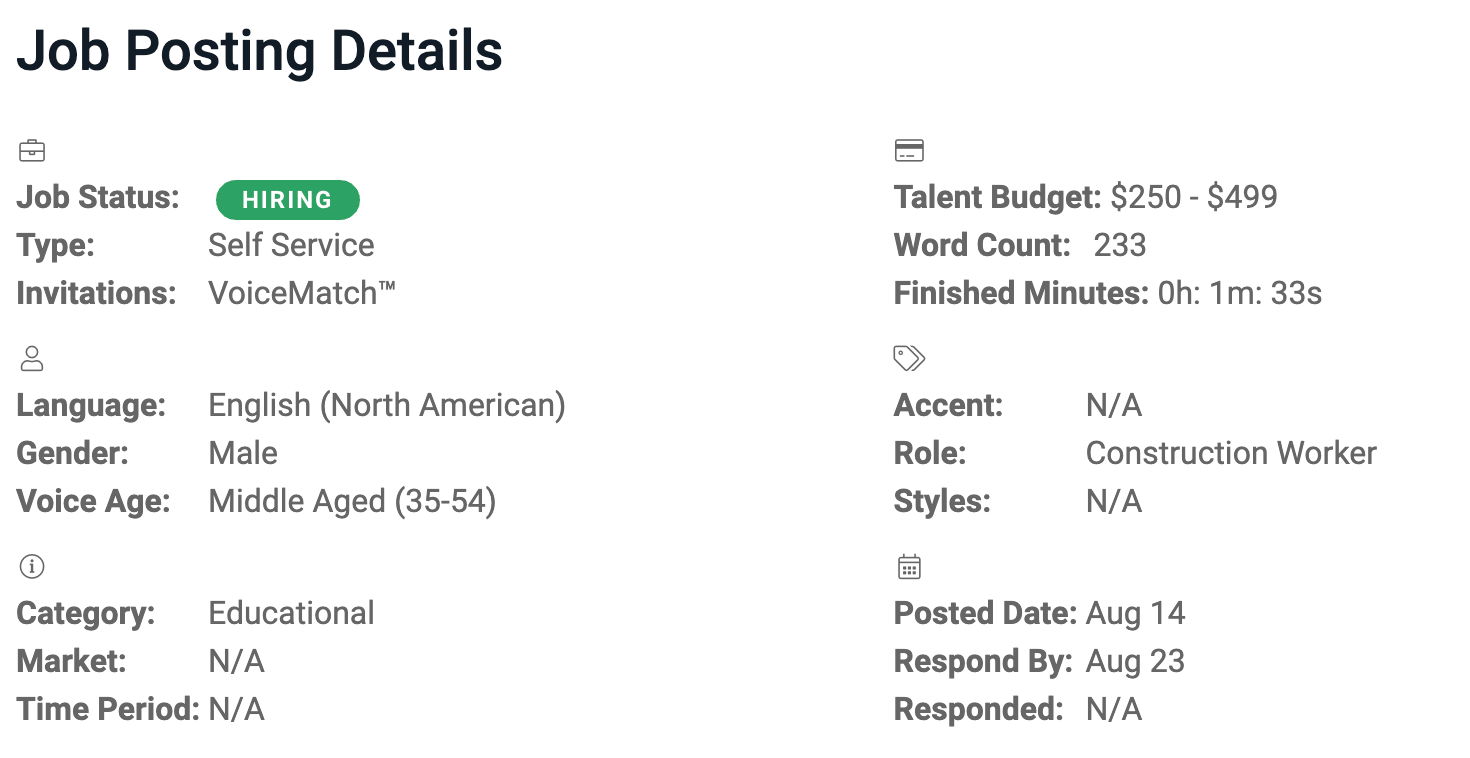
The job posting details section gives you a general overview of the job.
First, that the job is still hiring. That’s good, it means the client is still accepting auditions for this job.
Then it’s got the respond by date. Remember that is the deadline for auditions (when they’ll stop accepting auditions), not the project deadline.
Language, gender and voice age are pretty standard and should already meet your profile.
Based on the category, we know the final voice over is educational in nature.
Two other really helpful pieces of information to know are the word count and the budget. You already knew the budget from the invitation email but now with the word count you know more about the scope of work. So using this information decide whether the amount of work required is worth the pay set in the budget.
If you’re willing to do the amount of work required for the pay suggested, you’ll want to continue gathering information on this job.
On the right side, you’ll find some very important information: “Accent”, "Role" and "Styles".
These 3 fields are a goldmine for self-directing your audition!
These are tags the client has selected from a list to describe how they imagine the voice over will sound.
This section is really helpful when auditioning.
Some of the adjectives that are often used are calm, excited, announcer, conversational, deadpan, sophisticated, the list goes on and on. These descriptions will give you insight as to what the client wants to hear from your audition.
It’ll also help you eliminate the job if the description doesn’t fit your voice. For example, the client may use Southern or Irish as a description. If that’s not your voice, you’ll know right away to delete the job.
Now that you have a better grasp of what the client is looking for, you can move on to the job description.
Voice Over Job Script & Instructions
The job description area is a great place to get really detailed information about the job. When it’s well written, it’ll specify project deadlines, file types, extra things you should look out for in the script, provide additional artistic direction, and sometimes links to voice over scratch tracks or an existing voice over as a reference.
Scratch tracks and references can help you with timing, pacing, tone and style. All really helpful in the audition process.
This is where you should take your time to read during the auditioning process because the job description gives you a lot of specific information and direction the client is expecting.
If you rush through without reading and understanding the job description and client expectations, you may miss specific directions from the client. That could lead to misunderstanding the true scope of the project or missing some important instructions. If that happens, the client will think you can’t follow instructions and will not give you a chance.
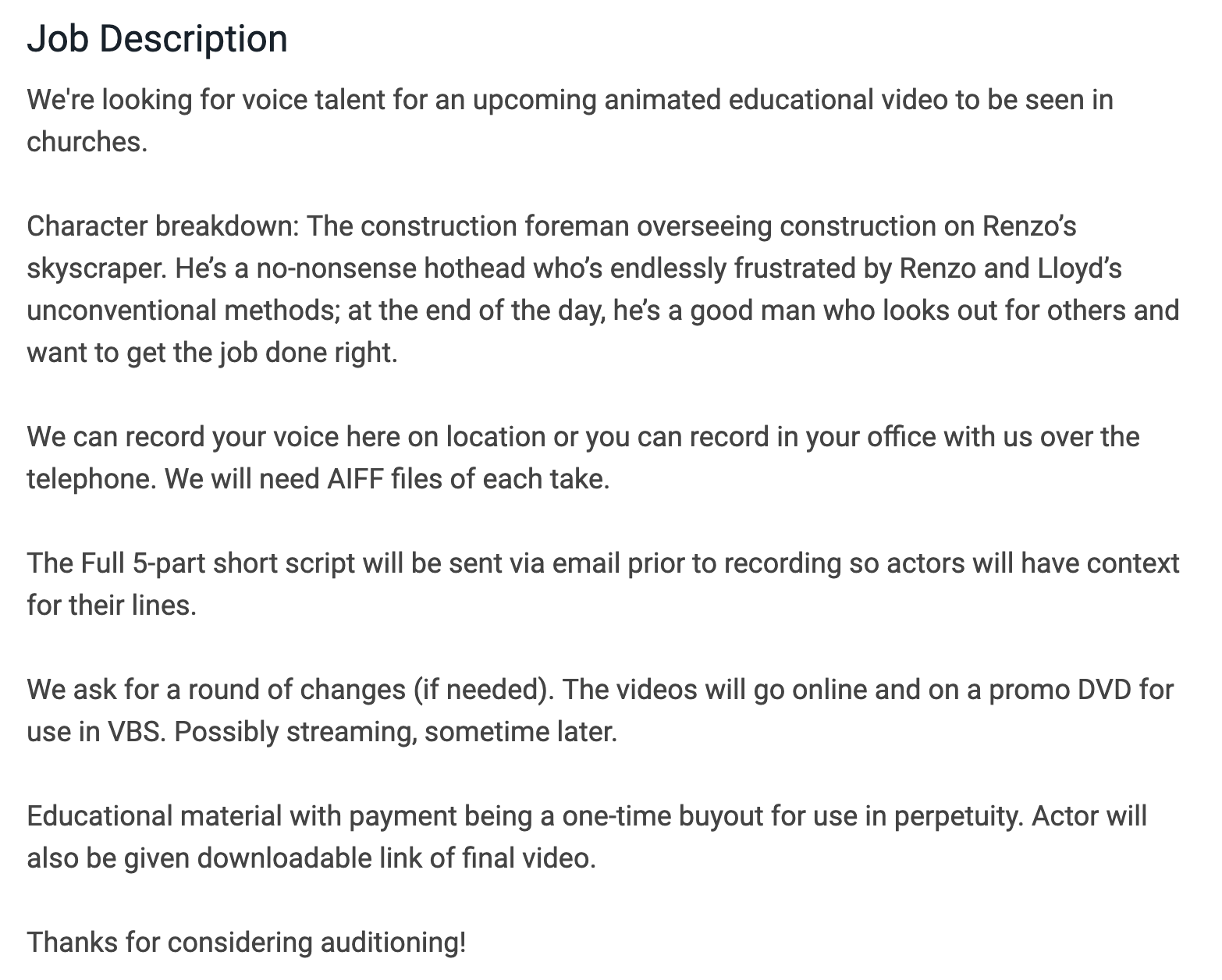
It's important to keep in mind, most jobs want “custom auditions only” in order to be considered.
Some voice actors will decide they either don’t have time or don’t have access to a studio in order to record a custom audition. So they submit a generic demo and hope to be considered.
Please never do that.
If a client takes the time to put up a sample script, they expect to receive a sample of THEIR script. Not some generic demo of what you’ve done in the past. They want to hear YOUR voice on THEIR script.
Some descriptions also mention a specific recording start date. So if you’re planning to leave for a two week vacation tomorrow morning, that would be a reason to delete this job and not audition.
I can’t stress it enough: Read the job description carefully for details and instructions.
Recording the Audition
There will be instances when you don’t have all of that information. Some people are more detailed than others when writing their description. Use the info that’s been included to make a decision about whether you want to audition for this job or not.
So you’ve seen your VoiceMatch score, how many other talents have already auditioned, the word count of the script, the client’s budget and detailed instructions, you’re ready to throw your voice into the voice casting pool for a shot at landing a voice over gig. Great!
You’ll see a sample script provided by the client on the page:
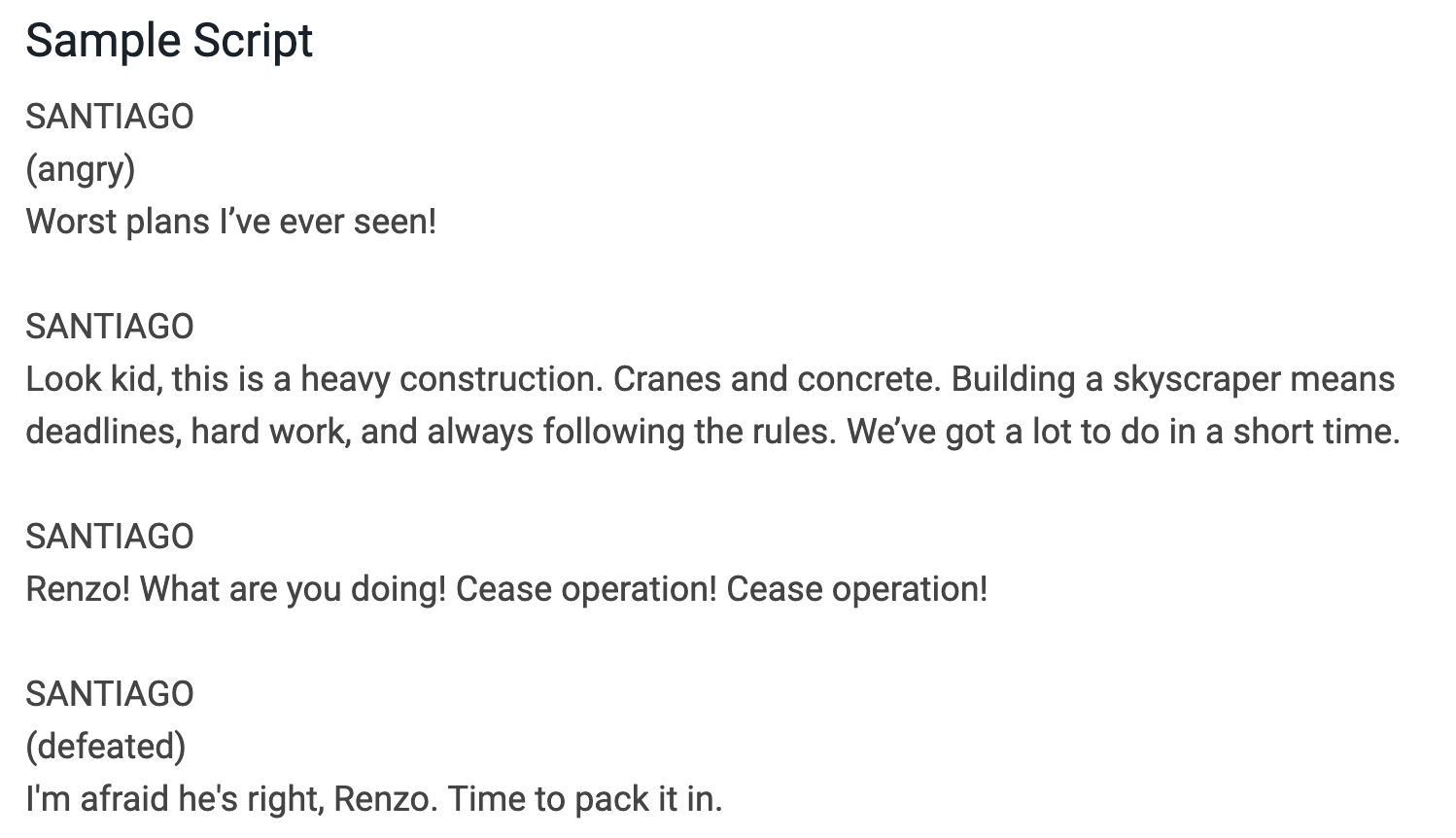
An audition is usually only a few sentences or about 30 seconds worth of script.
Read over the sample script a couple times, incorporating what you read in the job description and keeping in mind the tags found in the accents, role and styles section of the job posting.
Once you feel comfortable with the script, record your audition! Save it as an MP3 file and hit “Reply to Job”. From there you’ll just fill out your proposal along with your quote and submit your audition.
Congrats! You’re done!
The client will now review your audition and contact you by private message if they feel you’re a good fit for their script.
You’ll Get Faster at Submitting Voice Acting Auditions
This may seem like it takes a lot of thought to submit an audition. It does. That’s because you don’t want to audition for jobs that don’t fit your voice and acting ability. That is a waste of everyone’s time.
Once you audition a few times you’ll speed right through the process of reviewing the job, making sure you’re a good fit and submitting your audition.
And now that you know what to look for when responding to voice acting auditions on Voices.com, you’ll respond to fewer invitations but will have a better shot at landing more voice over jobs.
Step-by-Step Voice Acting Auditions Video
Here’s a quick step-by-step video on answering voice acting auditions on Voices.com:
Now you know exactly how to audition on Voices.com
Being a member of and responding to voice acting auditions on Voices helps you learn about the different types of scripts available and exposes you to a wide variety of projects that are currently hiring voice actors.
And most importantly, it helps you practice voice over every single day with the added bonus of possibly being hired for a voice over job.
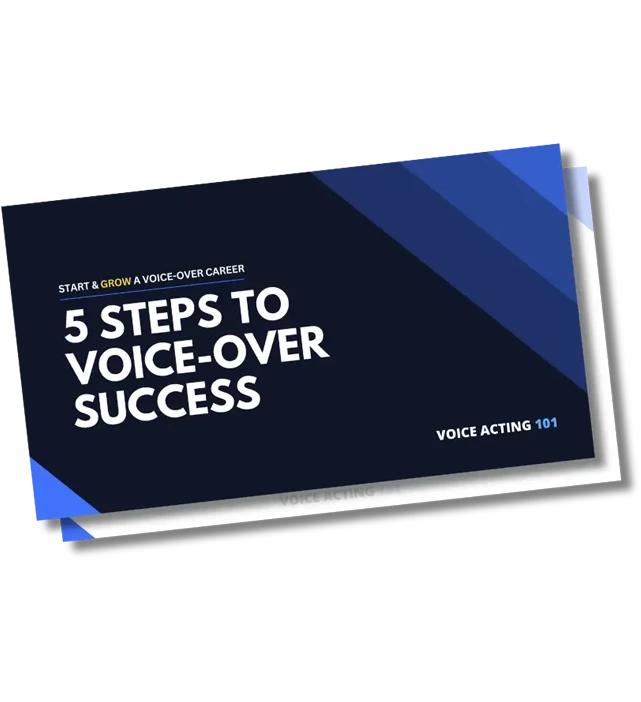
Am really interested
It’s probably definitely just me, but I’m not finding the audition templates no matter where I click or look . Yeah it’s definitely me.
Hey Terry, On Voices you’d create them at: https://www.voices.com/talent/templates This article may help https://www.voices.com/blog/write-a-strong-proposal/
Hi Jason, Great article but I have a few questions I don’t feel were addressed. 1) There is a budget range in this audition. You are Required to fill in your fee. What do you enter when there is a range? 2) How should your demo file be labeled? 3) Slate or no slate? and 4) I cant find your Proposal Template as that is a critical part of this process? Thanks!
Hey Matt! For budget, it’s up to you. Don’t go below the range, but it can within or even above the suggested range. Whatever you feel is fair. Include your name in the demo file name. No need to slate.
My question is: what are the industries specs for submitting an audition? I understand .WAV or an MP3 but, what about db? and Editing? I wonder if I’m losing out on auditions because I don’t have the specs dialed in correctly. Reading for Librivox gives specific instructions on what they want their specs to be when submitting a reading. I’m finding this not to be the case when auditioning for a commercial, or narration. Is this something you can help me with?
99% of auditions are MP3 files. Levels shouldn’t go above -3db. It should be edited and sound like a polished final product.
I’m constantly told I have a very distinguishing voice. Minnesota with a weird accent. Not sure. Always curious about voice acting. I think I would be good.?
Hello everyone, eversense I was young I’ve been into voice acting anime characters. I’m currently 18 and hoping to find a position to voice act an anime character. Please email me if your interested in me.
Greetings! I am definitely interested in being a part of The Voice industry. I’ve been doing characters ever since I was a little baby girl. I have so much experience and I credit it to every single day for majority of my day, I’m acting out and displaying my character impressions of characters I’ve created and also of TV show characters. I have my own characters that I’ve made up in my daily life that are extremely well-rehearsed due to the fact that I do them every single day. I even talk to my family members in complete inner contact of my voices. I enjoy it because it’s just something that comes natural to me and something that always has just been inherently something that is routinely something I do everyday. I’m most in my true element when I’m living through my characters. Sincerely, Chelsea Lorene Dekle, Las Vegas, Nevada.
Dear Sir or mam I want to work in voice .com as voice actor I submit some audition but that all was wrong I don’t.nt know.how can I do audition I m fersher in dis field but m interested for dis opportunity. I can talk very well in Indian languages Plz help me .Thanku
Dear sir or mam, i want to work in voice.com as voice actor but how can i do audition and i am fresher in this field but am interested for this opportunity. But i can perform in Hindi or punjabi languages comfortably Thanku
Quick question about the recording process…I’ve done voice overs for a couple of training videos at a company I was working for at the time. I simply used a basic voice recording software on my laptop and a good mic.
After the first one was published, someone in another department had asked which company had done the voice so they could hire the same person and he was surprised it was just a fellow employee with a laptop and a good quality headset.
It sounds like that’s not sufficient here though. What sort of equipment is required for home recording in these cases?
Most important would be the mic, audio interface and acoustically treating the room. You can see a list of options at https://voiceacting101.com/voice-over-resources/
Jason I had the free version but then I joined
Here’s how it looks since the update.
https://uploads.disquscdn.com/images/f5efd63e570f8fa389fb5fdfdadf448092b197f746ee326c1a714156bc12b750.png
Here’s how it looks now.
Mine doesn’t look like that but it’s closer,the match % is the same but the responses is still in the boxes. thanks I think it’s the same
crashcole what
Hello Jason in the video I just watched in one section it shows,, reply to job,, voice match (I don’t get this one) responses,,, print (not this either) report,, and delete (not this either) do I have a different version..
Do you have a paid account or the free version? That may be the difference. Also, they just recently released a cosmetic update to the site. So everything is the same but may look slightly different.
Hello Jason, For auditions on Voices, it sounds like one needs to have their own voice over recording equipment to participate in auditions (i.e. capability to record your own auditions). For a new voice actor looking to get work it is a challenge to invest in recording equipment plus the Voices membership fee. Do you always need to record your own audition for th auditions posted on Voices? Thanks so much!
Hi Francesca, Yes – having a home recording setup is a must. If it were me, I’d hold off on the membership fees and invest in the home recording setup first. You can get work without online casting site memberships, but you can’t get work without recording gear. Yes, almost all jobs posted require custom auditions nowadays.
Thanks for the helpful input! Would you be ok with me sending you my demos for review? I would love honest feedback from a seasoned professional. Hope that’s not too much to ask. Thanks!
Sure – feel free to email a link.
Thank you! I emailed the link.
new question how do i sent a wav file on voiice.com
Jason, I’m really enjoying your content as I get my start, I find myself referencing your guides regularly. It seems like there is a lot of controversy regarding voices.com especially by established talent. But, for a newbie the volume of work on voices.com affords me the great opportunity of many swings at the bat, not to mention that it’s a heckuva lot of fun. I also like that the platform is forward thinking and disruptive in the space.
Thanks Tyler! Glad you’re enjoying the guides.
Does Voice have any voice over work for singers? I have done studio recording and voice overs in the past, but am now living overseas (teaching music at a university) and looking for some at home work on the side. I can sing anything. Is this a good resource to find any of those kinds of jobs? jingles, etc?
I’ve seen postings for singers in the past, but it’s very rare. I would reach out to jingle creation companies.
Thanks Jason. I just found a few elsewhere. I could probably start searching through old contacts I guess. The studio I did a lot of work for closed. I’m sure it’s out there somewhere. Hate to ask you more but maybe something you’very already posted about somewhere…any place to post demos that doesn’t cost an arm and a leg? Speaking and singing clips to show what you can do? Voice may do that? I’m just hesitant to pay 400.00 without knowing if the jobs are really there. You don’t have to answer. But that’s something I would be interested in readingetting more up on. I’m guessing if you are producing a blog and tapping into blog income, something I am thinking about too, the voice overs are not a big chunk of change. I’m not looking for full time pay, but supplemental income. Have a good day. And thanks again.
If I were you I’d create a website and post my demos there. Then market your website. That’s the best way to build a business.
I actually don’t make money from this blog at this time. I’m a full-time voice actor, so 100% of my income is from voice-over jobs.
Thank Jason. I was just listening to Laraine Newman, from the original SNL cast, talk about voice over work and she was asked what the biggest challenge was and she said “getting work”. I thought if SHE can’t get work, I don’t have a prayer!
Interesting interview and worth watching btw. Thanks for your time. Have a great week.
@disqus_kL0sKVGH9p:disqus, any chance you can shed some light on the financial investment part of joining Voices.com? I too am hesitant to spend $400 on a membership. I consider myself a professional voice actor and am confident in my work. However, I feel uncertain about wether or not I’ll make my money back. I’d like to think I’d be able to make a few extra dollars a month through Voices.com, keeping me afloat, while I search and market myself elsewhere. Is this unrealistic?
Hey Zack,
I haven’t run the numbers recently but a couple years ago my Voices ROI was around 16X. That’s only for new work, not repeat clients.
Some people try pay-to-play sites and strike out miserably, going all year and thousands of auditions without a job. Without hearing their daily auditions, it’s hard to say why.
But I believe if you do these 4 things:
1. Record great voice-over
2. Follow instructions and specs of script
3. Audition quickly
4. Only audiion for jobs you’re a good match for
You’ll have a great chance at winning jobs.
These types of sites DO have a lot of competition and each audition should be thought of like a job interview.
Bring your A game each and every time.
So what. YOU want to hear me ramble? I’m the best at rambling. Come hear me rambling.
Your instruction is always short and easy to understand. I’m a newbie at this and I don’t live in America. All of your articles are really helpful to me. Thank you very much.
Thank you Vicky! Glad the articles are helping you!